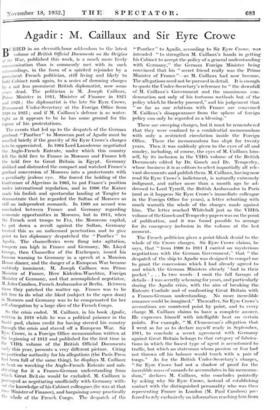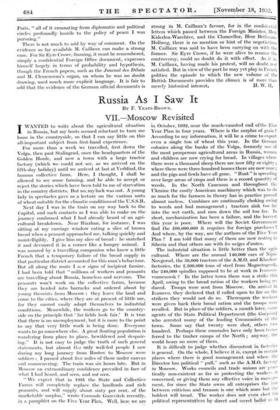Agadir : M. Caillaux and Sir Eyre Crowe
BITIED in an eleventh-hour addendum to the latest volume of British Official Documents on the Origins of the War, published this week, is a much more lively communication than is commonly met with in • such surroundings, in the form of a spirited rejoinder by a pmminent French politician, still living and likely to hold Cabinet -rank again, to a series of damning charges 1w- a not less prominent British diplomatist, now . some Vearti dead. The politician is M. Joseph Cadieux, Prime Minister in 1911, Minister of Finance in 1925 and 1926; the diplomatist is the late Sir Eyre Crowe, permanent Under-Secretary at the Foreign Office from IVO to 1925; and if M. Caillaux's defence is as water- tight as it appears to be he has some ground for the vigour of his protestations.
The events that led up to the despatch of the German gunboat " Panther " to Moroccan port of Agadir must be recalled briefly if the gravity of Sir Eyre Crowe's charges is to be appreciated. In 1904 Lord Lansdowne negotiated the Anglo-French Entente, under which this country left the field free to France in Morocco and France left the field free to Great Britain in Egypt. Germany disliked and distrusted the compact and watched France's gradual conversion of. Morocco into a protectorate with a peculiarly jealous eye. She forced the holding of the Conference of Algeciras in 1905, to put France's position under international regulation, and in 1906 the Kaiser made his foolish and spectacular landing at Tangier to demonstrate that he regarded the Sultan of Morocco as still an independent monarch. In 1909 an accord was concluded between France and Germany regarding economic opportunities in Morocco, but in 1911, when the French sent troops to Fez, the Moroccan capital, t:). put down a revolt against the Sultan, Germany treated this as an. unlicensed penetration and to give point to her diplomacy despatched the " Panther " to Agadir.. The chancelleries were flung into agitation, tempers 'ran high in France and Germany, Mr. Lloyd Ceorge, then Chancellor of the Exchequer, issued his famous warning to Germany in a -speech at a Mansion House dinner, and the danger of a European War became suddenly. imminent. M. Joseph Caillaux was Prime Minister of France,- Herr Kiderlen-Waechter, Foreign Minister of Germany, and that accomplished negotiator, M. Jules Cambon, French Ambassador at Berlin. Between them they patched the matter up. France was to be left free to do what she liked (subject to the open door) in Morocco and Germany was to be compensated for her self-abnegation-by a large slice of the. French Congo.
So the crisis' ended. M. Caillaux, in his book 'Agadir, Written in 1919 'While he was a political prisoner in the Sant e gaol, claims credit for having steered his countrY through the crisis and staved off a European War. Sir Eyre Crowe, in a Foreign Office memorandum written at the beginning of 1912 and published for the first time in the VIIth volunie of the British 'Official Doeuments early this year, 'Presents a very different picture. Citing Ito particular eutherity for his allegations (the Paris Press had been full of the same thing), he displays M. Caillaux as bent oh -wrecking the Anglo-Freneh Entente and sub- stituting for it a Franco-German understanding from which Great Britlin would be excluded. M. Cadieux is Portrayed as negotiating unofficially with Germany with- out the knowledge of his Cabinet colleagues (he was at that time Minister of Finance), and bargaining away practically the whole of the French Congo. The despatch of the "Panther" to Agadir, according to Sir Eyre Crowe, was intended "to strengthen M. Caillaux's hands in getting his Cabinet to accept the policy of a general understanding with Germany," the German Foreign Minister being convinced that his "secret friend really was the Prime Minister of France "—as M. Caillaux had now become. The allegations need not be pursued in detail. It is enough to quote the Under-Secretary's reference to "the downfall of M. Caillaux's Government and the unanimous con- demnation not only of his tortuous methods but of the policy which he thereby pursued," and his judgement. that "so far as our relations with France are concerned M. Caillaux's disappearance from the sphere of foreign policy can only be regarded as a blessing."
These arc sweeping charges, but it must be remembered that they were confined to a confidential memorandum with only a restricted circulation inside the Foreign Office. There the memorandum has slept for twenty years. Then it was suddenly given to the eyes of all and sundry, including, of course, the eyes of M. Cadieux him- self, by its inclusion in the VIIth volume of the British Documents edited by Dr. Gooch and Dr. Temperley. whose business it is as editors to select impartially all rele- vant documents and publish them. M. Cadieux, having now read Sir Eyre Crowe's indictment, is naturally extremely indignant, and rather more than a month ago he ad- dressed to Lord Tyrrell, the British Ambassador in Paris (and as it happens Sir Eyre Crowe's immediate colleague in the Foreign Office for years), a letter rebutting with much warmth the whole of the charges made against him. The letter reached Whitehall just as the VIIIth volume of the Gooch and Temperlcy papers was on the point of publication, and it was found possible to arrange for its emergency inclusion in the volume at the last moment.
The French politician gives a point-blank denial to the whole of the Crowe charges. Sir Eyre Crowe claims, he says, that "from 1908 to 1911 I carried on mysterious negotiations with the German Government," that "the despatch of the ship to Agadir was designed to compel me to grant the concessions which I had already agreed to and which the German Ministers already 'had in their pocket' . . . In two words—I omit the full farrago of details—I was secretly scheming for years, and particularly during the Agadir crisis, with the aim of breaking the Entente Cordiale and of confronting Great Britain with a Franco-German understanding. No more incredible romance could be imagined." Thereafter, Sir Eyre Crowe's accusations are countered point by point, and to every charge M. Caillaux claims to have a complete answer. He expresses himself with intelligible heat on certain For example, "M. Clemenceau's allegation that I went so far as to declare myself ready in September, 1911, to conclude a secret agreement with Germany against Great Britain belongs to that category of fabrica- tions in which the basest type of agent is accustomed to traffic, but which no statesman whom passion or fear had not thrown off his balance would touch with a pair of tongs." As for the British Under-Secretary's charges, "Sir Eyre Crowe had not a shadow of proof for the incredible mass of canards he accumulates in his memoran= dum," declares M. Cadieux, who concludes pointedly by asking why Sir Eyre Crowe, instead of establishing contact with the distinguished personality who was then representing France in London (14, Paul Cambon) pre- ferred to rely exclusively on information reaching him from Paris, "all of it emanating from diplomatic and political circles profoundly hostile to the policy of peace I was pursuing."
There is not much to add by way of comment. On the evidence so far available M. Caillaux can make a strong case. For Sir Eyre Crowe, framing, it must be remembered, simply a confidential Foreign Office document, expresses himself largely in terms of probability and hypothesis, though the French papers, such as the Journal des Debate and M. Clemenceau's organ, on whom he was no doubt drawing, used much more explicit language. It is fair to add that the evidence of the German official documents is strong in M. Caillaux's favour, for in the confidential letters which passed between the Foreign Minister, Hen Kiderlen-Waechter, and the 'Chancellor, Herr Bethman- Hollweg, there is no mention or hint of the negotiations M. .Caillaux was said to have been carrying on with the former. Sir Eyre Crowe, if he were alive to resume the controversy, could no doubt do it with effect. As it is, M. Caillaux, having made his protest, will no doubt rest satisfied. But in view of the part he may yet play in French politics the episode to which the new volume of the British Documents provides the climax is of more tham

































































 Previous page
Previous page